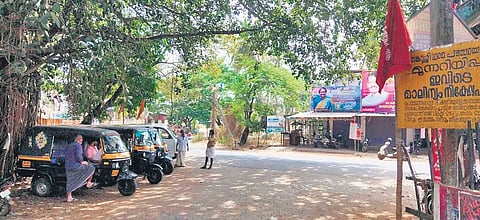

At Thenkurissi, life is as slow as in any of the villages in the Alathur parliament constituency. Just a few people are out in public as others take refuge from the scorching sun. At 11am at the local junction, with the temperature soaring above 38 degrees Celsius, a few autorickshaws parked under a large banyan tree await patrons and small vendors customers.
Unlike in the Malayalm film Odiyan, in which the shapeshifting lead character transports the audience to a wonderland, real-life Thenkurissi lays bare the harsh realities of the daily life of ordinary people before the candidates in Alathur.
While UDF’s Ramya Haridas is seeking a second successive term in the historically Left fortress, the LDF has deputed Minister K Radhakrishnan to wrest back the reserved seat. The NDA candidate is T N Sarasu.
In 2019, Ramya captured the constituency from CPM’s P K Biju who was attempting a hattrick. However, the Left front reclaimed their dominance in the 2021 state elections, winning all seven assembly segments under the Lok Sabha constituency. “The contest is between Ramya and Radhakrishnan,” says Bijoy, who works as a distributor. “Ramya has performed well. The BJP is not a strong force here.”
However, in the last local elections, the BJP captured three wards. “BJP’s vote share is increasing with each election,” says Vighnesh, an autorickshaw driver. He says Ramya is very much approachable. “She attends programmes and has installed high-mast lamps in all 17 wards. But the trend is in favour of Radhakrishnan as he is a serving minister. People see Ramya the way they see Shafi Paramblil. Shafi’s shift to Vadakara is a setback for Ramya,” he says.
Salim, a mango grower for over two decades at Muthalamada, Kerala’s own ‘mango city’, says there is little work at the grassroots for the UDF. “CPM workers are covering all houses. There will be at least 10 workers at the CPM party office here. But the Congress party office has been shut down,” he says.
The mango farmers of Muthalamada have been left devastated by crop loss because of erratic weather and an alleged non-cooperation from government departments.
“This year, Muthalamada will suffer losses of Rs 2,000-3,000 crore per day,” Salim says. The number of mango farmers in the region has come down to 1,400, he points out.
“Climate change is the primary reason. Mango trees had flowered in November but the rain took them down. Though they flowered in December, the blossoms were not strong and the fruits were small,” Salim laments.
His group had borrowed around Rs 5 lakh from a businessman from Maharashtra, he says. “We have to give them the mangoes at the start of the season, with the country’s mango season usually starting at Muthalamada. This time, we were forced to borrow mangoes from Andhra Pradesh and Karnataka to be packed and sent to Maharashtra,” he says.
The farmers blame the increase in the rate of fertilisers, high labour cost and the agriculture department’s unfavourable attitude for their pathetic situation.
“The department officials didn’t advise us about the usage of pesticide and its volume. We were forced to buy pesticides from private companies in Tamil Nadu. And there might be a high volume of pesticide and insecticide sprinkled on the mangoes by labourers, most of whom are migrant workers,” Salim says.
A lack of infrastructure development is visible in the area as 60% of the villagers are construction workers. The lack of work forced women to avail loans from private lenders. And to repay them, these women are working in small shops.
“Life here becomes active only in the evenings, as there would be some relief from the heat. People come to the junction and some queue up in front of the beverages outlet,” says Kunchan Kutty, another autorickshaw driver.
Visitors from the southern districts would be surprised by the state of the toddy shops in the region. The only luxury item available is a boiled egg. Operating from small huts, the shops have just one or two desks and benches, like the one at Kunissery. Without inhibitions, villagers visit the shops around noon to drink palm toddy that helps cool the body.
“Visiting a toddy shop is not a social stigma here,” says Ponnu who has been runny a toddy shop for nearly 10 years.
“However, after the Indian made foreign liquor became widespread, the number of customers has fallen to 10. The production of palm toddy has also come down because of climate change. About 10 years ago, we used to get 150 litres. Now it has shrunk to 50. One litre of toddy sells for Rs 100.”
Koduvayur resident Kunju’s life as an agricultural labourer has been full of struggles — as part of the communist movement — against challenging life situations and oppression by upper caste/class landlords.
“We would be sent to graze cows at 2am. Then, we have to help our parents in the paddy fields. We would hardly get three hours of sleep. For grazing a cow, I used to get Rs 1 per day. We also went to Kalpetta in Wayanad to work on coffee estates from 7.30am to 5.30pm,” he recalls.
After 65 years of hard labour, Kunju has an acre of farmland and two cows. Thankfully, his two daughters are in government service and son employed in the private sector. Kunju then took leave of this reporter on his bicycle. Life goes on.